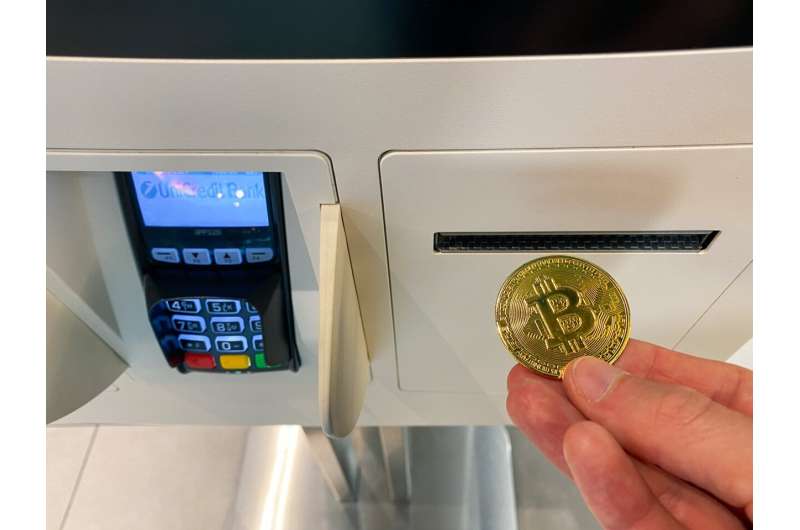Credit: Unsplash/CC0 Public Domain
Walk into a smoke shop or small convenience store in South Florida—anywhere from Homestead to Boynton Beach—and you might find not one, but two, ATM machines.
Look closely before you try to get cash because there's a big difference.
One dispenses paper bills, greenbacks to spend. The other spits out a paper receipt for Bitcoin, far and away the most popular crypto currency. Nothing wrong with that if you're comfortable with converting your honestly earned dollars into crypto.
But South Florida's cybercrime detectives also say crooks are using the growing number of Bitcoin machines for nefarious purposes. They say the machines, though perfectly legal, are also largely unregulated and are often used to "wash" dirty money—cash that has come from drug dealing, robberies or other illegal activities.
When it's easy to invest in cryptocurrency online, Miami-Dade Cyber Crimes Task Force Cmdr. George Perera questions the need for the Bitcoin ATM machines, which don't leave much of a financial trail.
"Why have those unless it's for criminal activity?" he asked.
Finding a machine is as easy as turning on a computer or a cellphone. The website bitcoindepot.com—which helps you find a Bitcoin ATM by simply inserting an area code or city—shows there are 1,691 machines in Florida and 384 between Boynton Beach and Homestead.
The machines, which have gained popularity in the past few years along with cryptocurrencies, are believed to number more than 50,000 across the country. There's a reason they're attractive to the small businesses where they are most common—they're profitable at several levels.
The largest manufacturers of the machines are the companies Genesis Coin and General Bytes. They sell the machines for as much as $5,000. They're basically internet-connected kiosks that send cryptocurrency to a digital wallet after actual money is inserted. Machine operators pocket fees, which at Bitcoin ATMs represent a percentage of the transaction.
Store operators, meanwhile, collect rents from the machine operator or owner for a three-by-three foot space.
In a speech about the industry in 2021, Digitalmint director of compliance Seth Sattler acknowledged there were some "bad actors" who gave the machine industry a bad name by continuing to allow anonymous transactions. Digitalmint is one of the leading providers of Bitcoin machines and technology in the nation.
"While a small number of Bitcoin ATM operators go above and beyond ... others in the cash-to-crypto industry simply turn a blind eye and are complacent to these bad actors by simply applying the bare minimum customer protections, which in many cases allow for completely anonymous transactions," Sattler told the news site.
The Bitcoin ATM machine looks almost exactly like its counterpart, with a computer screen, a keyboard and a slot to slide in money—as if you were making a deposit at a regular ATM. And the way criminals clean money with it is as brilliant as it is simple.
Here's a scenario: A small-time drug dealer makes a few thousand dollars on a sale. The dealer then hires a kid for a few dollars to type in a cryptocurrency address and insert the money into the machine. In exchange, the machine spits out a Bitcoin receipt worth the same or a similar amount.
Miami-Dade's cyber cops say one problem is that the machines are very lightly regulated. Most have a video recording device and some ask to scan driver licenses. Crooks, though, can work around that easily, said Miami-Dade cybercrimes Sgt. Bridget Doyle.
In the case of the example cited above, the kid hired by the launderer would be videotaped. And he or she could easily have used fake identification. As for checking on a crypto address, it changes for each action and is difficult to trace, detectives say.
Doyle said most companies notify a shopkeeper if more than $6,000 is deposited. She said there are about a dozen companies that she's aware of that now sell cryptocurrency machines.
"When criminals move into crypto, the first thing they do is go about finding a new ID," she said.
2022 Miami Herald. Distributed by Tribune Content Agency, LLC.
























